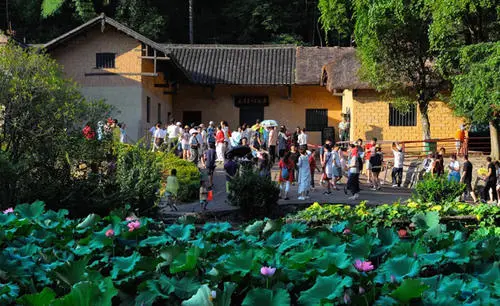

Hunan is a treasured place with glorious history and great people. As the place where Qu Yuan and Jia Yi lived and Confucianism was developed and spread, Hunan has nurtured its culture featuring the spirit of “caring about the world, daring to become a pioneer” and “Upholding humanistic pragmatism and inclusiveness”. In modern times, many prominent fi gures such as Zeng Guofan, Zuo Zongtang, Tan Sitong, Huang Xing and Cai E sprung up. During the period of the new democratic revolution, Hunan was the center of the national peasant movement, the cradle of the Chinese revolution, and the vital battlefield of the War of Resistance againstJapanese Aggression. Some Hunanborn proletarian revolutionaists including Mao Zedong, Liu Shaoqi, Ren Bishi, Peng Dehuai and He Long, made signifi cant contributions to the founding of the Communist Party of China and the People’s Republic of China.
湖南是一块人杰地灵的宝地,素有“古道圣土”“屈贾之乡”“潇湘洙泗”等美誉,孕育了以“心忧天下、敢为人先、经世致用、兼收并蓄”为精神特质的湖湘文化。近现代涌现出曾国藩、左宗棠、谭嗣同、黄兴、蔡锷等杰出人物。新民主主义革命时期,是全国农民运动中心、中国革命重要策源地、抗日战争重要正面战场。毛泽东、刘少奇、任弼时、彭德怀、贺龙等无产阶级革命家,为创建中国共产党、缔造新中国作出了卓越的贡献。
Shaoshan is where Zedong’s former residence is located. Mao Zedong was born and raised here. It is exactly what we say “The people are the reflection of their own environment.”
湖南的韶山就是毛泽东的故居所在地。毛泽东生于此,长于此,所谓“一方水土养一方人”,正是如此。
Remembrance of Mao Zedong
追忆伟人
On December 26th, 1893, Mao Zedong was born in an ordinary farmhouse in a small village on the flatland of Shaoshan and grew up there. He liked reading when he was a little boy. He started his formative education at the age of eight in an old-style private school in Nan’an, and spent a lot of time reading the famous classics, such as the Four Books and Five Classics, Romance of the Three Kingdoms and Journey to the West. Once, he borrowed eleven books from his cousin Wen Yunchang, including some new books such as Words of Warning to a Prosperous Age written by a reformist in the late Qing Dynasty called Zheng Guanying. Such books had widely broadened his horizon.
1893年12月26日,毛泽东诞生在韶山冲上屋场的普通农舍里,并在这里度过了他的少年、青年时代。他自小便酷爱读书,8岁开始在南岸的私塾接受人生的启蒙教育,熟读“四书五经”和《三国演义》《西游记》等经典名著。一次,他从表兄文运昌处借了11本书,内有清末改良主义者郑观应的《盛世危言》等新书,大大地开拓了视野。
17 years later, Mao Zedong left his hometown for the first time for his further education, and began his life as a striver. Before leaving his hometown, he wrote a poem to his father, showing his ambition to strive for a glorious future: “I have determined to step out of the village, and sworn to never return if I cannot accomplish my study. Why shall my grave be stuck in the birthplace? Everywhere can be the green mountain where the soul rests.”
17 年后,毛泽东第一次离开家乡去外地读书,从此开始他奋发图强的一生。离开家乡前,他给父亲留下一首诗,表明他为光明未来奋斗的决心。“孩儿立志出乡关,学不成名誓不还。埋骨何须桑梓地,人生无处不青山。”
Wandering around the Residence
畅游故居
The former residence of Mao Zedong is located in a small village on the flatland of Shaoshan city. It has a fascinating scenery with beautiful mountains and rivers. Entering the old house, we can still see the traces of Mao Zedong’s life: the bed, desk and wardrobe in the bedroom, the square table and chairs in the central room, the stone mill, water wheel and big wooden rake in the farm tools room. We can even have a taste of Mao Zedong’s favorite braised pork in brown sauce in the restaurants nearby. Dishuidong is in the west corner of Shaoshan flatland, which is 3 kilometers away from Mao Zedong’s former residence. Here we can see the office, bedroom, reception room, meeting room and recreation room that Mao Zedong used. There is a big office table with brush rack and inkstone on it. The meeting room is larger than the office. In the middle of the recreation room is a ping-pong table. We can see a photo of Mao Zedong holding a bat on the photo wall. Now we have entered the era of peace, but the glorious deeds of those great men should be deeply embedded in our mind. Wandering around Mao Zedong’s former residence, we should cherish today’s happy life more.
毛泽东故居坐落在韶山市韶山乡韶山村土地冲上屋场,这里山水秀丽,风景宜人。走进老屋,里面还保留着毛泽东当年生活过的痕迹,卧室中的床、书桌和衣柜,堂屋中的方桌和板凳,农具室中的石磨、水车和大木耙等一一映入眼帘。在故居旁边的餐馆里,我们甚至还可以品尝到毛泽东爱吃的红烧肉。滴水洞位于韶山冲西边的角落里,与故居相距 3 公里,这里有毛泽东当年使用过的办公室、卧室、会客厅、会议室、娱乐室等。办公室内有一张大办公桌,桌上有毛笔架、砚台。会议室比办公室大,毛泽东曾在此开会。娱乐室正中摆放着乒乓球台,墙上有一张毛泽东手握球拍的照片。时光飞逝,如今我们已经迈入和平年代,但我们应该将伟人们的光辉事迹深深地印在我们的脑海中。漫步伟人故居,我们也更能体会到如今幸福生活的来之不易。
责编:田梦瑶
来源:策策连载
 湖南日报新媒体
湖南日报新媒体
